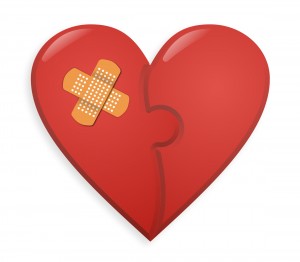Before discovering that I had IBS, I suffered pains that resembled to the unstable angina symptoms, I was at the hospital emergency twice, they performed ecg, stress test and even an angiogram. When I described my symptoms to the doctors, they all agreed it sounded like something going on with my heart, unstable angina indicates an underlying heart condition, that needs to be carefully diagnosed and treated.
I was getting increasingly worried, every time I had another chest pain.
After performing a lot of tests, the conclusion was that there was nothing wrong with my heart (thankfully).
Although I was thrilled that my heart and arteries were healthy, I was puzzled on those symptoms. It took another year of chest pains, bloating, nausea, diarrhea etc. to finally get a diagnosis: I had IBS – Irritable Bowel Syndrome.
One of the doctor said that possibly my symptoms were due to the fact that I was not assimilating magnesium.
Since then I have also discovered that acid reflux gives very similar symptoms too.
So either one problems or a combination of the two, may have caused those unstable angina symptoms.
Thankfully a dietician introduced me to a low FODMAP diet; this diet helped me incredibly, I have lost some weight and probably because of that, the acid reflux problem improved and I also started to take magnesium supplements, since then I’ve only had those symptoms once or twice a month, compared to before, when I had them almost every day.
During the past few months I have been investigating IBS symptoms and discovered that its symptoms are often mistaken for some other serious diseases.
IBS can be characterized by abdominal pain relieved by bowel movement, pain in the upper abdomen that may mimic chest pain, nausea, headache, muscle aches, fatigue and difficulty concentrating.
If like me, you also suffer of IBS and have the same symptoms I had, amongst other tests, you may want to look into magnesium deficiency as well as possible acid reflux or GERD.
While not life-threatening, the effects of IBS can be debilitating, leading to frequent absences from the workplace and can have a negative impact on people’s quality of life. IBS is generally classified as a functional disorder because it impairs the functioning of the body’s normal activities, such as sensitivity of nerves of the intestines and the movement of the intestines.
Please note that I’m not a doctor, a nutritionist, a registered dietitian and neither a fitness expert. In this blog I am sharing my experience with IBS, with food, low FODMAP diet and life. This is purely my experience and it is not my intention to give you advice. When it comes to your health and fitness, consult your GP and do your research.


Larah, I’m really happy finding this thread. I’m a 48 years old guy and had the chest problems for a couple of days. As soon as I read this post I took the car and went to ER. I was convinced that it has something to do with my heart. I was especially concerned because all the symptoms pointed out that it could be angina. I will also have to mention that 25 years ago I had a car accident and ruptured my aorta. So this was, and is, a nightmare having chest pains. Well after have done the blood tests and an Ecg the doc ruled out it was a heart related problem. And just for security I’m waiting for the appointment for a treadmill test. I hope I’ll get that done soon.
I’ve have had problems with my tummy for a good couple of years but it has become much worse when I started to take Cymbalta, an antidepressant. I was on it for six weeks and then another two weeks for weaning it off. A pill every second day. I don’t know how to put it to people considering starting with an AD, but please do not go near Cymbalta. I had and still have the worst side effects possible. On top of that it even says in the description for it that one of its side effects are chest pains. I had used effexor for good twelve years but it started to lose it effect, that’s why my neurologist suggested Cymbalta. I just wish I had read on it before even touching it. You I’m that type of person that trust a doctor and think that he knows what he is doing. But I’ve learned my lesson. Suffice to say is that these three months I have been almost entirely staying in bed and anxiety, depression crying spells, a totally ruined tummy, headaches, suicidal thoughts and what not.
So this is really where I am coming to is that cymbalta totally ruined my tummy all the way and after speaking to a gastro doc he is suspecting I developed IBS and even GERD. I’m in the process to have more tests done as well as I have to start seeing a psych doc for anxiety and depression. Please believe me I have never before touching Cymbalta anything near these problems. I’m just so disappointed with myself not being more cautious and knowledgeable about this life changing Cymbalta.
I will post my progression when I have done the treadmill programme as well how my development with the IBS or GERD goes. It may help some other people I hope.
Jerry from Sweden
Hi Jerry, I am so sorry for what you have been going through and for your health issues. Thankfully I have found a doctor that is willing to look at the cause of my symptoms, rather than trying to ‘fix’ the symptoms. The low FODMAP diet has done wonders for me, that is why I have decided to write this blog.
I do not get those chest pains very often now, but when I do, I don’t worry anymore, as I know my heart is healthy and it is the IBS causing my symptoms.
I hope you will get better soon Jerry, please let me know how you progress with your new health program. I wish you all the very best.
This blog is a source of great information, great work Larah!
Thanks John, I’m glad you find my blog useful. Thanks for stopping by.
Does anybody else get a bit sleepy after taking magnesium supplements? I am not talking about a full-on fatigue, but more like a nice, relaxed type of sleepy. I usually take it at night, and it works even better if I have had a stressful day. Am I the only person who gets this?
Personally I don’t get sleepy after taking magnesium supplements, but it may do so to others. Anyone out there?
That’s right. The gas created in IBS goes to chest and creates ache there which results in making us that we’re having some chest related pain which infact is related to stomach and digestion. I’m inspired by your helping people by sharing information about IBS as well as your personal experiences. than you Larah.
Hi Prya, thanks for your comment.
While many patients diagnosed with IBS may have other medical problems such as depression, anxiety and fibromyalgia which may contribute to atypical muscle aches and musculoskeletal complaints, chest pain is not considered within the spectrum of symptoms caused by irritable bowel syndrome. There are a number of other causes of achy chest pain, some of which are concerning enough (such as heart disease) that you should see your primary care physician to discuss your symptoms. Your doctor will be able to conduct a thorough history and physical exam and may choose to have you undergo further testing to help come up with a diagnosis. This testing may involve blood work or procedures such as an exercise treadmill test. In any case, chest pain should not be attributed to IBS unless all other possibilities are excluded first.
I definitely agree with you doctor, chest pains can have very serious consequences and should not been taken lightly. In my case I was lucky that they weren’t. Rather live with IBS than heart problems, that’s for sure.
When I read the title, I couldn’t figure out what the two had in common but you explained it well and now I have some useful insight into what might be wrong with me.
Thanks for your comment Sarah. I was shocked and relieved to find out that my chest pains were not related to my heart at all 😀
The chest pains only lasted about 20 minutes, as soon as I took an aspirin, they went away, that is why everything pointed to heart issues. Thankfully not 😀
Chest pains every day sounds excruciating. I’m had gas related chest pains before, and they were debilitating. It’s hard to get off the floor let alone function on a daily basis.
That said, I can understand what a relief and revelation the diagnosis and change of diet were for you. I only hope this can inspire others who suffer from IBS to seek the help and information they need to live quality lives.
IBS doesn’t just sneak up on you, it tricks as well. For all the symptoms you had, it would be hard not to say that it was a heart disease or a condition of the like. IBS being a much more less serious one, but at the same time it still debilitates and must drive those with it crazy. I have a friend who has IBS, but didn’t know for a long time until checking with a doctor. She now eats healthy, but still is feeling the symptoms at large. Maybe she is consuming too many FODMAP foods, though. I’m glad it does go down depending on diet.
I am truly so lucky that the low FODMAP diet has worked for me, although I recognise that it may not be like that for some IBS sufferers.